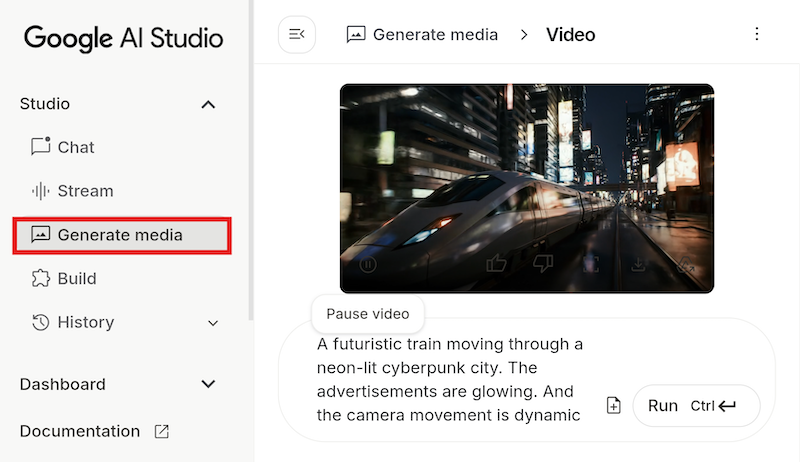What is Veo 2 and How Does it Work: The Ultimate Veo 2 Guide
Check out the Veo 2 guide as well as its features and uses across industries.

Veo 2 is the newest generative video model from Google DeepMind. It does not just produce short clips. It promises cinematic quality with prompts as simple as a line of text or a static image.
Unlike older AI video tools that demanded detailed, rigid prompts, Google Veo 2 works with natural language. For example, you can ask it to create a scene of a waterfall at sunset. The system brings it to life within a minute. DeepMind calls it a text-to-video model, but its strength lies in how it balances creative freedom with realism. In this Veo 2 guide, we will explore how DeepMind Veo 2 works and even how it compares with Veo 3.
- History of Veo 2: Concept to Reality
- How does the DeepMind Veo 2 work?
- Features of DeepMind Veo 2
- How to Access DeepMind Veo 2?
- Use cases of DeepMind Veo 2
- Is Veo 2 Free to Use
- Veo 2 vs. Veo 3: Which Model is Better for AI Video Generation
- Pros and Cons of DeepMind Veo 2
- Alternatives to Veo 2 for Text-to-Video Generation
- Features of X-Design AI Agent
- Comparing Video Generation Alternatives With Veo 2
- Future Implications of Veo 2
- Faster Content Creation
- Better accessibility for Content Creators
- Smarter Video Evolution
- Conclusion
History of Veo 2: Concept to Reality
2019–2020: Early Experiments
2021–2022: Model Development
2023: Launch of Veo 2
|
How does the DeepMind Veo 2 work?
Veo 2 works on a simple idea: text and images can become videos without needing cameras. It is a transformer-based model designed by Google DeepMind, trained on vast collections of video and image data. Instead of forcing you to master complex commands, it listens to natural prompts.
For example, if you ask for “a desert storm rolling across the dunes,” Veo 2 builds not just the visuals but also the physics of dust and light. If you upload a photo, you can animate it into a flowing video that feels organic.
Features of DeepMind Veo 2
Before Veo, Google had Imagen Video and Phenaki, both early experiments in text-to-video. These models proved that AI could dream up moving images, but they were limited by resolution and realism. Veo 2 is the upgrade that ties these loose ends together.
Feature | What It Does | Why Is It Important |
Veo 2 Text-to-video conversion | Converts natural language prompts into cinematic videos. | Removes barriers for creators without technical skill. |
Veo 2 Image-to-video conversion | Animates still photos into moving scenes. | Expands creative options beyond text-only input. |
Scene realism | Captures fine details like shadows, reflections, and camera angles. | Produces videos closer to film-grade quality. |
Scalable resolution | Generates videos in high definition with consistency. | Works for both social media and professional projects. |
Creative flexibility | Adapts styles, pacing, and visual mood based on input. | Makes it useful for storytellers, marketers, and educators. |
So while the roots of Veo stretch back to earlier DeepMind projects, Veo 2 represents a more polished and production-ready system. It is not just about what the AI can imagine but also about what it can maintain over time.
How to Access DeepMind Veo 2?
Veo 2 is now open inside Google AI Studio, and getting started is very simple. You don’t need advanced setups or technical skills. Just follow these steps:
Step 1: Sign in to AI Studio
Go to Google AI Studio and log in with your Google account. No special invite is required. Then click ‘Generate Media’ from the options in the left nav bar. Then click ‘Veo’ from the options.
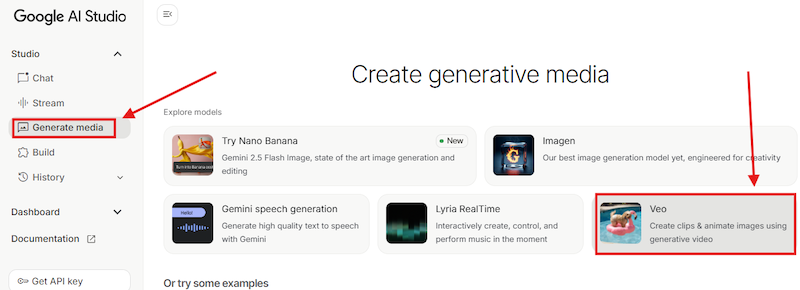
Step 2: Enter your prompt
You can be as simple as you want, or creatively describe the video. You can also upload images as a reference, and then click ‘Run’. Here’s what we used:
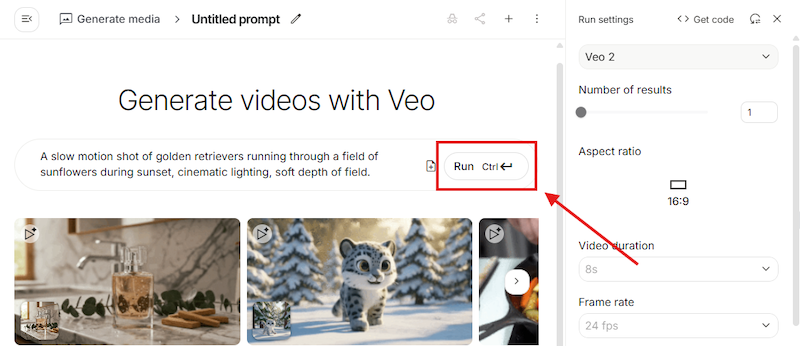
Prompt: A slow-motion shot of golden retrievers running through a field of sunflowers during sunset. The lighting is cinematic. While the depth of the field is positive. |
Step 3: Download the video
The video will be generated within seconds.
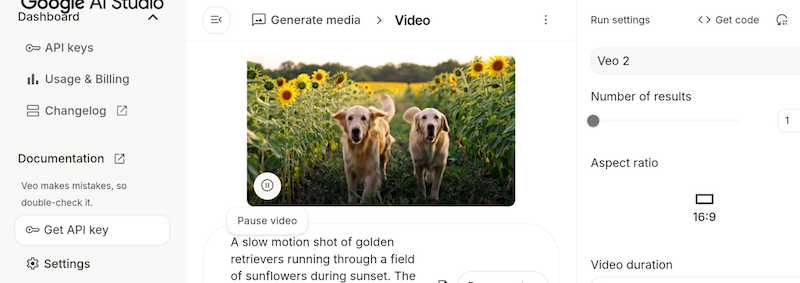
You can download it by clicking the ‘Download’ icon at the bottom. It gets automatically saved to your device.
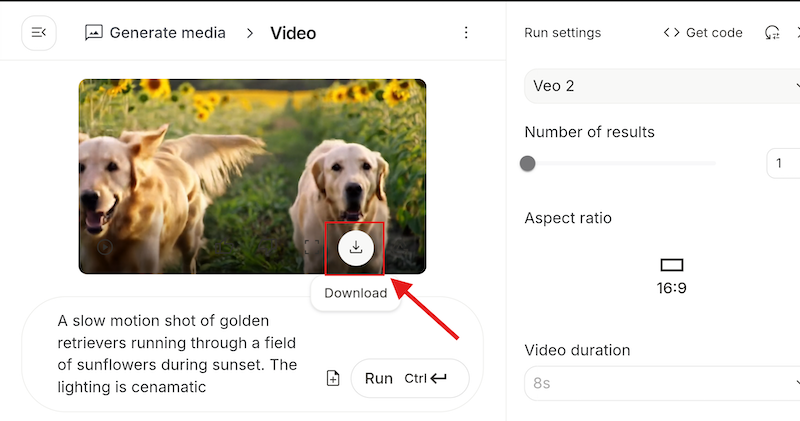
For developers, Veo 2 is also available through the Gemini API. But for everyday creators, AI Studio is the most direct and friendly way to access it. We tried creating some more videos using the Veo 2. Here are the results we got:
Prompt: A child flying a kite on a windy hilltop. The clouds are moving fast. The lighting is warm. Throughout the clip, the camera tilts gently. |
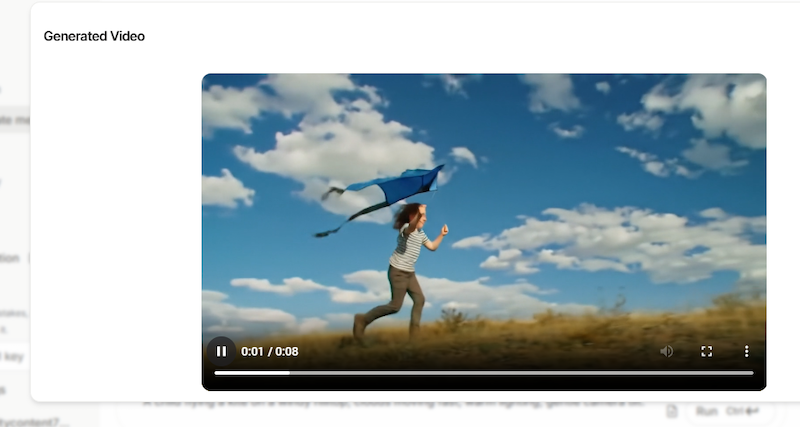
Prompt: A futuristic train moving through a neon-lit cyberpunk city. The advertisements are glowing. And the camera movement is dynamic. |
Use cases of DeepMind Veo 2
Use Case | Description |
Social Media Content | Veo 2 makes AI video for TikTok, YouTube Shorts, or AI video for Instagram Reels. |
Education | Teachers can turn notes or simple text into engaging video lessons for students. |
Marketing | Brands can create quick ads or product demos without spending on big production. |
Filmmaking | Directors can use prompts to visualize shots before they go on set. |
Corporate Communication | Companies can share updates or reports as short videos instead of plain slides. |
Storytelling | Writers can bring poems, ideas, or scripts to life as creative short films. |
Event Promotion | Event organizers can make teasers or quick highlight videos in minutes. |
Content Repurposing | Bloggers and creators can turn their articles into short, dynamic videos. |
Is Veo 2 Free to Use
Veo 2 does not have a fixed price attached to it. You can open it in Google AI Studio and start creating videos straight away. No credits. No subscriptions. Just sign in and experiment with its text-to-video features. Google has kept it available in this preview stage so anyone can try it without worrying about cost.
But things look different inside Gemini. When Veo 2 shows up there, you are accessing it through Gemini’s ecosystem. And Gemini runs on a subscription model. That is why you see a pricing page. So the tool itself is not paid for, but the way you access it decides if you pay or not.
Veo 2 vs. Veo 3: Which Model is Better for AI Video Generation
Google's Veo 3 introduces significant enhancements over its predecessor. This happened particularly in areas like audio integration, visual realism, and user control. While Veo 2 laid the groundwork for AI-driven video generation, Veo 3 elevates the experience to a more immersive and refined level.
Feature | Veo 2 | Veo 3 |
Audio Integration | Requires manual addition of audio in post-production. | Native audio generation, including dialogue, sound effects, and ambient noise. |
Video Quality | Supports up to 4K resolution with realistic motion. | Enhanced 1080p resolution with improved physics-based video simulation. |
Lip Sync Accuracy | Basic synchronization of character speech. | Realistic lip-sync matching character speech to mouth movements. |
Prompt Handling | Handles simple text prompts effectively. | Improved understanding of complex prompts, including multi-input prompts. |
User Control | Limited control over camera angles and scene transitions. | Enhanced control with camera motion, angles, and perspectives via integration with Flow. |
Access Platform | Available through the Gemini app with limited features. | Available through the Gemini app and Vertex AI for enterprise users. |
While Veo 2 serves as a solid foundation for AI-generated video content, Veo 3 offers substantial improvements. These cater to creators seeking more control and realism. The integration of native audio and advanced user controls makes Veo 3 a compelling choice for professionals.
Pros and Cons of DeepMind Veo 2
Major Pros of using Veo 2 for video generation:
Quick Video Creation: You can turn simple text prompts into visually rich videos without needing cameras.
Intuitive AI: Veo 2 understands natural descriptions and brings your ideas to life easily.
Creative Freedom: Experiment with different scenes and moods without spending a lot of time.
Social Media Ready: Create AI video for YouTube Shorts, or Instagram Reels in minutes.
Image-to-Video: Turn illustrations into cinematic clips effortlessly.
Accessible for Everyone: Get professional-looking videos even if you don’t have advanced editing skills.
Even though Veo 2 is powerful, it is still an evolving tool. There are a few areas where it does not yet match traditional video production.
Video Length: Clips are short, usually under 10 seconds. So long scenes aren’t possible yet.
Output Quality: Complex prompts may not always render perfectly.
Availability: Not all users can generate full videos yet; some accounts see only single-frame previews.
Resolution: Certain outputs are limited. Professional-grade 4K is not always supported.
Control Over Motion: Camera angles and movement options are still basic compared with traditional editing.
These limitations are part of the learning curve and gradual rollout. Even so, Veo 2 gives creators a remarkable way to turn ideas into cinematic videos without complex setups.
Alternatives to Veo 2 for Text-to-Video Generation
Veo 2 is impressive, but it’s not the only AI video tool available. One strong alternative is X-Design AI Agent. This tool goes beyond text-to-video. You can generate videos and even work with text-to-image prompts. It’s versatile for creators who want a single tool for multiple creative tasks.
X-Design stands out for its combination of flexibility and simplicity. Its AI-algorithm can handle both visuals and graphic design needs. This makes X-Design a solid option for marketers and content creators.
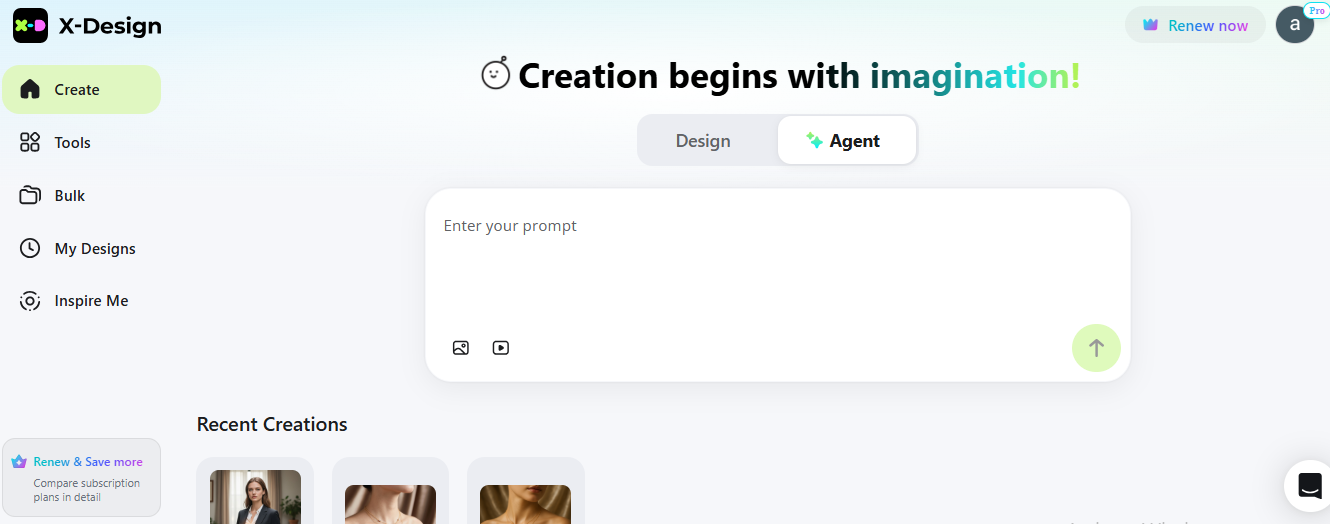
Features of X-Design AI Agent
Text-to-Video: Transform written prompts into short, cinematic videos. This is ideal for quick content creation.
Text-to-Image: Generate high-quality images from textual descriptions. It is deemed useful for visual storytelling.
Logo Creation: Design unique logos by inputting brand names and styles.
Poster Design: Craft professional-looking posters effortlessly. This benefit is suitable for making promotional assets.
AI Product Photography: Enhance product images by removing backgrounds and applying realistic settings.
X-Design is a complete visual editing suite. It not only helps you to generate images and videos, but also edit them with utmost precision. Most content creators use X-Design for upscaling their videos or removing text from videos. All of this can be done without design experience. The tool is intuitive for beginners without any quality compromise.
Comparing Video Generation Alternatives With Veo 2
Since Google started working on text-to-video generation tools, some great alternatives have also surfaced the internet. Most of them are AI models that have similar functionalities, yet some even exceed Veo 2’s outputs.
Tool | Key Features | Output Types | Best For |
Veo 2 | Text-to-video, image-to-video, cinematic short clips. | Short AI-generated videos | Creators seeking quick, visually rich videos. |
X-Design AI Agent | Text-to-video, text-to-image, logo creation, poster design, design assets. | Videos, images, graphic assets | Marketers, educators, and content creators need multi-purpose creative tools. |
Runway Gen 4 | Generative AI video with advanced tools, Aleph model for editing angles, weather, and props | Short to medium-length videos | Professionals requiring advanced editing capabilities. |
Synthesia | AI-generated avatars, studio-quality videos, and realistic talking avatars. | Presentation-style videos | Businesses creating training, explainer, or internal communication content. |
Pika Labs | Text-to-video, character generation, creative tools. | Videos, animations | Creators focusing on consistent character-driven content. |
Adobe Firefly | Text-to-video, image-to-video, AI-generated visuals. | Videos, images | Designers and marketers integrating AI into creative workflows. |
Future Implications of Veo 2
Faster Content Creation
Veo 2 allows creators to turn ideas into short cinematic clips in minutes. There’s no need for expensive cameras and complicated editing. This speed opens the door to experimenting with new concepts and producing polished videos quickly.
Better accessibility for Content Creators
Veo 2 makes video production accessible for marketers. It encourages experimentation with visual storytelling while removing traditional technical barriers.
Smarter Video Evolution
Future AI video models are likely to support longer clips. Users can get precise control over camera angles. This could make AI-generated video a standard tool for creators of all levels.
Conclusion
Veo 2 changes how videos are made. Simple text or images become short cinematic clips without complex software. Users can produce content faster. This Veo 2 guide emphasizes that despite Veo 2 being renowned, it has limits. Clips are short and resolution isn’t always professional-grade. Still, Veo 2 lays a solid foundation for AI-driven video creation.
For more versatility, X-Design AI Agent is a great alternative to Veo 2 for text-to-video creation. It not only generates videos from text but also creates images and crafts professional posters. This makes it a complete toolkit for creators who want to bring any visual idea to life quickly.
Related articles

The Creator's Guide to Veo 3.1: What's Changed and How to Use it

What is VEO 3.1? The Video Model That Demands Creative Control

The Best Roles for Veo 3.1: Where Google's New AI Video Model Excels


